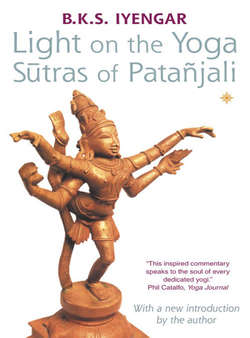Читать книгу Light on the Yoga Sutras of Patanjali - Литагент HarperCollins USD - Страница 65
I.7 pratyaksa anumana agamah pramanani
Оглавление| pratyaksa | direct perception |
| anumana | inference |
| agamah | traditional sacred texts or scriptural references, a person who is a scriptural authority and whose word can be relied on |
| pramanani | kinds of proof |
Correct knowledge is direct, inferred or proven as factual.
Correct knowledge is based on three kinds of proof: direct perception, correct inference or deduction, and testimony from authoritative sacred scriptures or experienced persons.
Initially, individual perception should be checked by reasoned logic, and then seen to correspond to traditional or scriptural wisdom. This process involves the enlightened intelligence, or buddhi.
In modern intellectual terms, we take buddhi to be a monolithic entity. This is unhelpful when trying to understand its true role in our lives and in our yogic practice. Let us first separate it from mind, in which brain, whose function is to receive sensory information, to think and to act, has its source. Thinking expresses itself in the form of electro-magnetic waves.
Intellect is more subtle than mind. It is concerned with the knowledge of facts and the reasoning faculty, and becomes discernible only through its inherent quality, intelligence, which is closer to consciousness than to the mind/thought process. Intelligence is inherent in every aspect of our being, from the physical to the blissful. It is non-manifest only in the atman/purusa, the core of being.
The quality of intelligence is inherent but dormant, so our first step must be to awaken it. The practice of Asana brings intelligence to the surface of the cellular body through stretching and to the physiological body by maintaining the pose. Once awakened, intelligence can reveal its dynamic aspect, its ability to discriminate. Then we strive for equal extensions to achieve a balanced, stable pose, measuring upper arm stretch against lower, right leg against left, inner against outer, etc. This precise, thorough process of measuring and discriminating is the apprenticeship, or culturing, of intelligence; it is pursued in the internal sheaths by pranayama, pratyahara and the further stages of yoga.
We can thus see that discrimination is a weighing process, belonging to the world of duality. When what is wrong is discarded, what is left must be correct.
When discrimination has been cultivated and intelligence is full and bright, ego and mind retreat, and citta becomes sharp and clear. But spiritual intelligence, which is true wisdom, dawns only when discrimination ends. Wisdom does not function in duality. It perceives only oneness. It does not discard the wrong, it sees only the right. (Patañjali calls this exalted intelligence, or vivekaja jñanam
